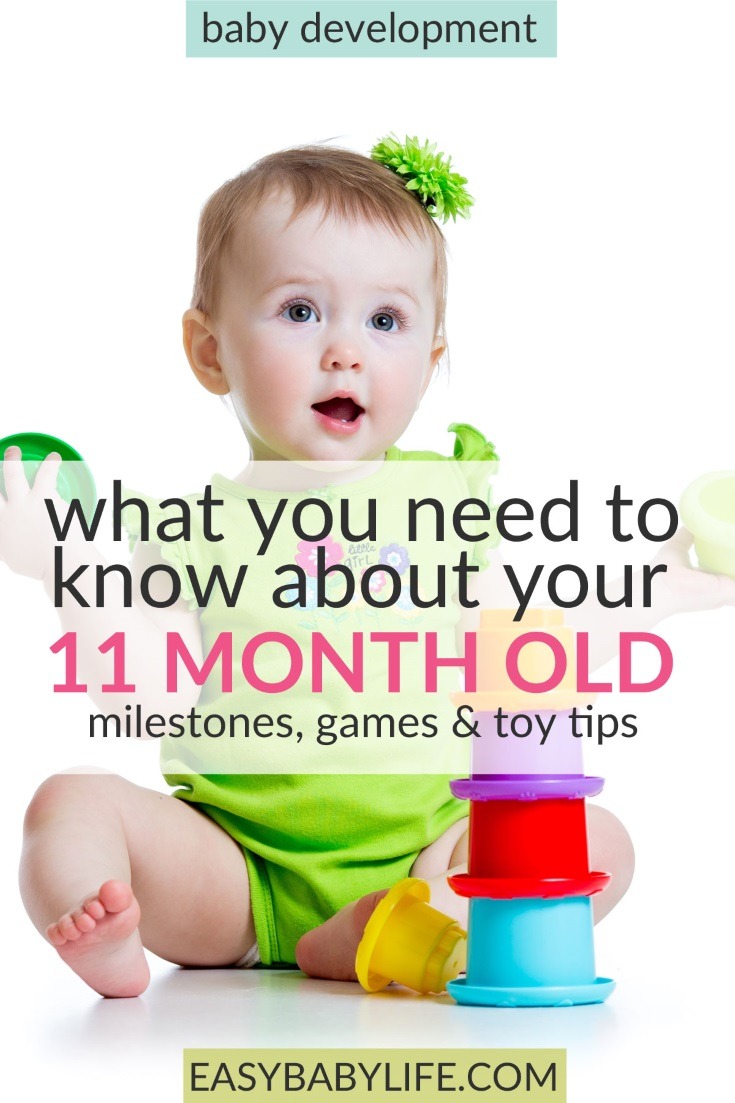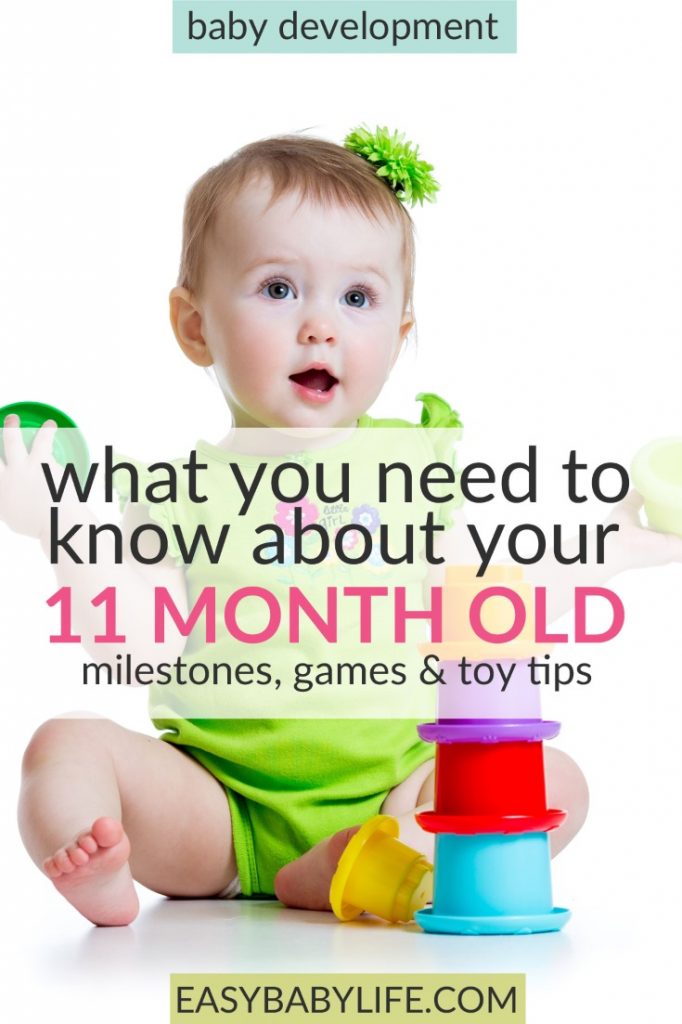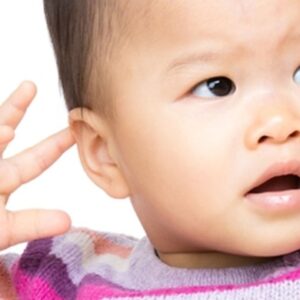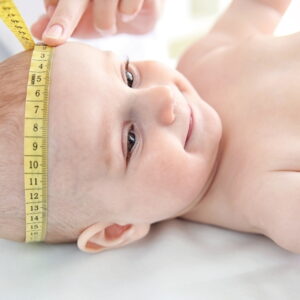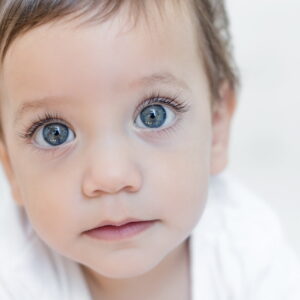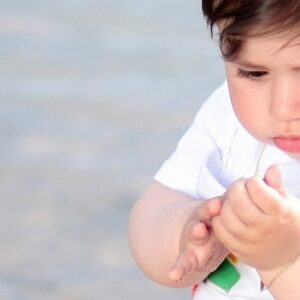In this article, you will find developmental milestones for the 11-month-old baby, ideas on activities and games to play, and toy tips. You can also see the typical 11-month old baby in action in video clips. Furthermore, read about developmental red flags to discuss with your baby’s health care provider.
10-month-old | 12-month-old
An 11-month-old baby has a lot of energy! Much more energy than judgment…
When she was 11 months old, our daughter fell while trying to pull herself up to a standing position, holding on to the TV. She crashed into a sharp corner with her eyebrow. Poor girl!
We rushed off to the hospital, convinced that she would need several stitches. I felt so bad!
Luckily no stitches were necessary, and today the scar is almost invisible.
If your baby is moving around, these are busy times! Safety is important as well as watching your baby more or less all the time. But no matter how hard you try, your baby is likely to get a little bit hurt from time to time. Try to minimize the risks.
This is a good time to baby-proof your home.
Something more fun to think about – your baby’s first birthday is coming up! Party time?
The 11-Month-Old Baby
In this article…
11 Months Baby Milestones
There is only one month left until your baby’s first birthday, and your baby is probably becoming more and more independent.
Here are the development milestones to look for when your baby is 11 months old.
Physical development
Weight and height
Remember that every baby is different and that the height and weight may vary for babies of the same age.
An 11-month-old baby boy will weigh approximately 20 pounds and 12 ounces (9.4 kg), while the average weight for an 11-month-old baby girl is 19 pounds and 4 ounces (8.7 kg).
When it comes to height/length, an 11-month-old boy will be, on average, 29.33 inches long (74.5 cm), while a baby girl of the same age will be 28.74 inches (73 cm).
Vision
At 11 months old, your baby sees almost as well as you do. The baby sees well both objects that are near, as well as the ones that are farther away. It is also possible for a baby to see moving objects now.
The vision is developed well enough for a baby to recognize objects and faces in pictures.
To help your baby realize that every object has a name, you can now point to objects and name them.
Teething when 11-month-old
When it comes to teething, as with many other things, it is important to remember that all babies are different. Some babies will get their first tooth at 4 months old, and some won’t get any during their first year of life. Because of that, it is hard to say exactly how many teeth your 11-month-old baby should have by now.
However, by the time your baby is 11 months old, there are usually two groups of teeth that had possibly already come in – central and lateral incisors.
Some approximate timeline in which they appear is as following:
- 6 – 10 months bottom central incisors
- 8 – 12 months top central incisors
- 9 – 13 months top lateral incisors
- 10 – 16 months bottom lateral incisors
However, don’t worry if this is not the case with your baby. As we already mentioned, all babies are individual, and the teething timeline might vary significantly for different babies. Here’s a Q&A about a baby with no teeth at 11-month-old.
Motor skills
Moving around
An 11-month-old baby is very active and is able to walk around while holding your hands. Although most babies this age still crawl or creep, some have realized how to move around while holding onto the furniture.
He or she will move away from you (or to you) one way or the other. It doesn’t have to be traditional crawling or walking; many babies develop their unique style. (Here’s a poll on crawling styles.)
Some babies this age can already walk independently. However, most are still not ready to do so. But they might try and take a step or a few shaky steps by themselves.
There are also babies who will climb long before they walk. That can be a real challenge for the parents!
As your baby practices taking the first steps, you need to minimize the possibility of your baby getting hurt by sharp edges or a piece of furniture that falls over when the baby uses it for standing up.
Standing
At 11 months old, a baby can stand without support or by holding your hands or a piece of furniture for support.
Using their hands
Your baby is using his/her hands more and more every day. You might notice that your baby raises their arms when he/she wants to be held, claps, throws things, bangs the objects together, waves, and points to them.
It is a very exciting time as you can teach your baby new gestures.
At this age, hand-eye coordination is even better, and your baby will enjoy stacking objects. His or her hand-eye coordination is good enough for him or her to stick the index finger into a hole, so be sure to baby-proof the home because your baby will go for those electrical outlets before you even notice it.
Your baby can eat and drink by himself/herself (well, at least some of the food and liquid will make its way into the mouth).
Speech development
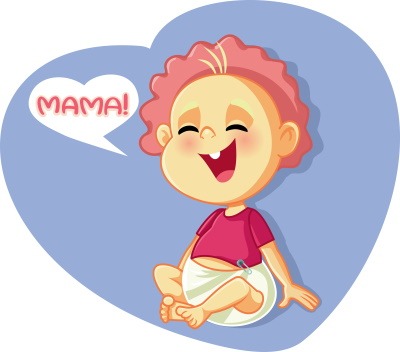 PinYour 11-month-old baby can make himself understood by using a few words. At 11 months, a baby will combine sounds that have meaning when said together and start saying words such as ˝mama˝ or ˝dada˝.
PinYour 11-month-old baby can make himself understood by using a few words. At 11 months, a baby will combine sounds that have meaning when said together and start saying words such as ˝mama˝ or ˝dada˝.
This is an exciting time when you can talk to your child and get a response.
Your talkative little sweetheart will try to have a conversation with you. Although you won’t recognize words, you’ll soon realize when your baby tries to explain something to you.
An 11-month-old can recognize familiar words and might even point to a particular object or a person when you mention it. Your baby might now also follow simple instructions like “go get that ball.”
At this age, the baby will listen to, or ignore, your ˝no˝. You will also notice your baby shaking their head as he/she is saying ˝no˝. It will sometimes seem to be a reaction to something you have said or asked.
Make sure to read to your baby and point to things while simultaneously naming them to support your baby’s speech and language development. Here are more ways to help your baby’s language development.
Cognitive development
Personality
Every day, your baby is showing more and more personality. You might notice your baby is indicating his/her preferences regarding food, play, etc.
An 11-month-old will also show you when something is not the way he/she wants it. Are you leading her to walk in the direction she didn’t have in mind? Did you say ˝no˝ to something he wants to do? Are you trying to change her diaper, and she doesn’t want to do it now? Well, be sure your baby will protest and show you when you are not playing by his/her rules.
Stranger anxiety
Although stranger anxiety is probably declining at this point, it might still be present. Your baby has developed strong relationships with the primary caregivers and has a good relationship with people around him/her regularly.
11-Month-Old Developmental Red Flags
Every baby is different, and not all babies reach a particular milestone at the exact same time. But there are some warning signs you should probably keep an eye on when your baby is around 11-months-old.
Some of the red flags at 11 months are when the baby:
- can’t sit without support
- doesn’t try to crawl, creep, or move around in any way
- doesn’t respond to own name
- isn’t trying to interact with you
- doesn’t recognize familiar people
- doesn’t look where you point
If you notice these developmental red flags for your baby, discuss the situation with your baby’s doctor or health nurse.
Games To Play
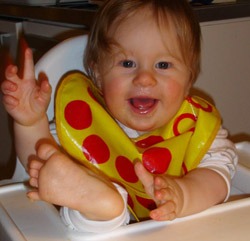 PinMusic, music, music. Dancing is an excellent way for a baby to practice his or her balance. Kneeling or standing and slowly rocking to the music is lots of fun.
PinMusic, music, music. Dancing is an excellent way for a baby to practice his or her balance. Kneeling or standing and slowly rocking to the music is lots of fun.
At this age, a baby practices new skills by repeating them again and again and again, like stacking blocks or taking things out of a bag and putting them back again.
Now that your baby probably sits steadily without support, playing in a sandbox can be great fun. Here are some tips for having fun at the playground.
Taking turns doing whatever is appreciated. Try pulling something out of a bag, making funny faces, or clapping hands.
Let your baby help you with your housework, like washing dishes or wiping the floor.
Best Toys for the 11-Month-Old Baby
Now it is time to start thinking about your baby’s 1st birthday presents. One of the best toys our children received at this age is a balltower from Fisher-Price. I would never have bought it if it wasn’t for the recommendation from another mother. All kids seem to like it!
The exact version my kids had is, however, not produced anymore for reasons I totally don’t understand, but Discovery Toys has a similar toy, that you can see here.
Some other toys that might be appreciated at this age are:
- Some sort of steady rider can also be fun. It needs to be quite low, though. Here is a super cute one, that doubles as a rocking horse. Most riders are for older children.
- Books with simple stories begin to be fun at this age. Try one with a simple story about something that is familiar to your baby.
- A bucket and spade to use in the sandbox are useful. If nothing else, the spade can be used to smash mom and dad with.
Video of an 11-Month-Old Baby
Here, you can see 11-month-old babies in action and learn more about the development to expect.
Where would you like to go next?
More About the 11-Month-Old Baby
- No Teeth for 11-Month-Old – Normal or Not?
- How To Cure Constipation For An 11-Month-Old Baby? Tips On Foods As A Natural Remedy
- My 11 Month Old Wakes Up Screaming – What Can It Be?
- All Posts About 11-Month-Old Babies
Research References
- Evidence-based milestone ages as a framework for developmental surveillance
- Is my child normal? Milestones and red flags for referral
- Mayo Clinic Guide to Your Baby’s First Years
10-month-old | 12-month-old

Paula Dennholt founded Easy Baby Life in 2006 and has been a passionate parenting and pregnancy writer since then. Her parenting approach and writing are based on studies in cognitive-behavioral models and therapy for children and her experience as a mother and stepmother. Life as a parent has convinced her of how crucial it is to put relationships before rules. She strongly believes in positive parenting and a science-based approach.
Paula cooperates with a team of pediatricians who assist in reviewing and writing articles.

